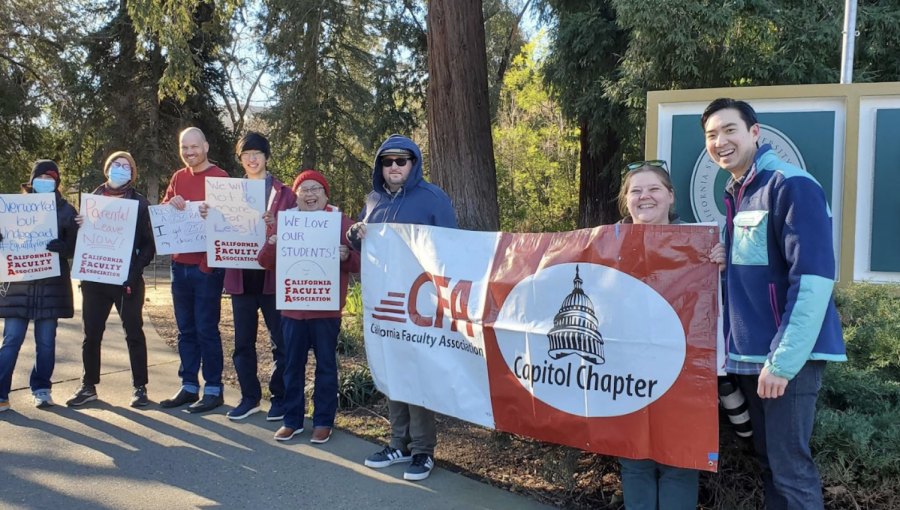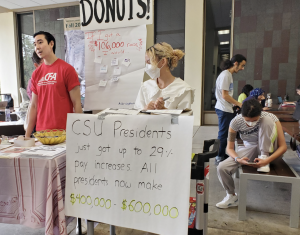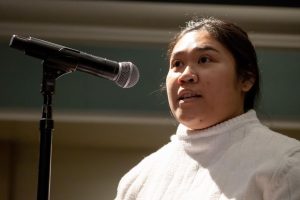Campus faculty union to face CSU with negotiations
Professors bargaining for semester-long paid leave, increased wages
Johnathan Rutz
California Faculty Association members and supporters holding signs and banners at Sacramento State’s campus entrance Jan. 23, 2023. The union is preparing for its upcoming negotiations with the California State University system in May.
April 4, 2023
In May, the California Faculty Association will have open negotiations with the California State University system seeking improved workload management, a semester of paid parental leave, increased wages for faculty and improved health and safety measures following the pandemic.
Previous negotiations occurred in December 2021, which representatives from Sacramento State’s CFA said went unresolved, causing this additional negotiation period.
Margarita Berta-Avila, president of the CFA branch at Sac State, said while the goal of negotiations is to meet faculty needs, union members can vote to strike depending on the outcome.
“There’s a whole process that you have to go through before you even get to any type of job action,” Berta-Avila said. “There has to be that opportunity to bargain.”
A Cal State system strike could look similar to how workers with the University of California walked out last fall.
Kathy Jamieson, community liaison for the Sacramento Chapter of CFA, said many of their Collective Bargaining Agreement articles impact not only faculty but students. This starts with issues with overworking faculty, she said.
“Faculty cannot bear the weight of enrollment caps due to the CSU’s mismanagement of course demands and scheduling,” Jamieson said. “There are repeated violations of assigning workload that creeps beyond the end of term such as summer duties that are not compensated.”
Instructors at California State Universities who lack the institutional support of full-time faculty are also losing work because of issues with work overloads, Berta-Avila said.
“Lecturers are losing their work, forcing them into a position of losing health care, medical care or not having the benefits to sustain their family,” Berta-Avila said. “[They are] often having to work two-to-three jobs at two-to-three different colleges, whether its community colleges or in the CSU.”
The union is also asking for a more liveable salary to meet California’s cost of living.
“We want to address the long-standing pay inequities among our lecturer colleagues,” Berta-Avila said. “They often feel more vulnerable, given the way the CSU often treats [part time] lectures as a second shift.”
Jamieson said graduate programs are also impacted by this issue, causing the campus to operate on the “donation of faculty workload.” She said that lecturers should be able to take on fair and timely workloads, while their counterparts who are full-time faculty aren’t faced with accepting overloads in class enrollments.
Faculty are forced to take on an overloaded schedule with sometimes no additional pay, Jamieson said.
“When faculty are forced to work overloads, the quality and quantity of time they can spend toward the success of each Sac State student is diminished,” Jamieson said.
Leave with pay is another issue on the bargaining table for the union. With a focus on parental leave, Sac State’s CFA is seeking to extend the duration of time allowed.
“We are an institution that is only offering parental leave for six weeks,” Berta-Avila said. “Six weeks is pretty much nothing for a family or parents that are either adopting a child or having their own child, to be able to spend that time with their child.”
Legislation was introduced in February addressing this issue. Assembly Bill 1123, introduced by Assemblymember Dawn Addis, Democrat from Morro Bay, asks for the CSU to grant an employee one semester of leave of absence with pay following the birth and/or placement of the employee’s child.
“The rhetoric of ‘We are a Hornet family’ sounds lovely, but it is empty rhetoric,” Jamieson said. “Management continues to put faculty and new family members at risk and continues to play with the academic continuity for students, rather than providing one full semester of parental leave.”
Following the pandemic’s remote learning, the union wants the Cal State system to use the lessons to adopt a hybrid-learning option. This is to not only address the health and wellbeing of faculty, Jamieson said, but also that of their loved ones.
Jamieson said changes might appear as hybrid instruction options, proactive accessibility support and ongoing classroom equipment wipe-downs.
The CSU and the CFA have a long history of partnering and negotiating together, Jamieson said, and the union hopes that continues with the upcoming negotiations.
Michael Uhlenkamp, senior director of public affairs of the CSU said they are committed to providing fair and competitive salaries and benefits to all of its employees.
Uhlenkamp said any future agreement between CFA and the CSU will need to align with “available funding” that aligns with the “Governor and the state’s economic circumstances.”
“As part of that commitment, the CSU looks forward to engaging in good-faith bargaining with all our labor partners including the faculty union,” Uhlenkamp said.
Additional reporting by William Duvall.



































































































































